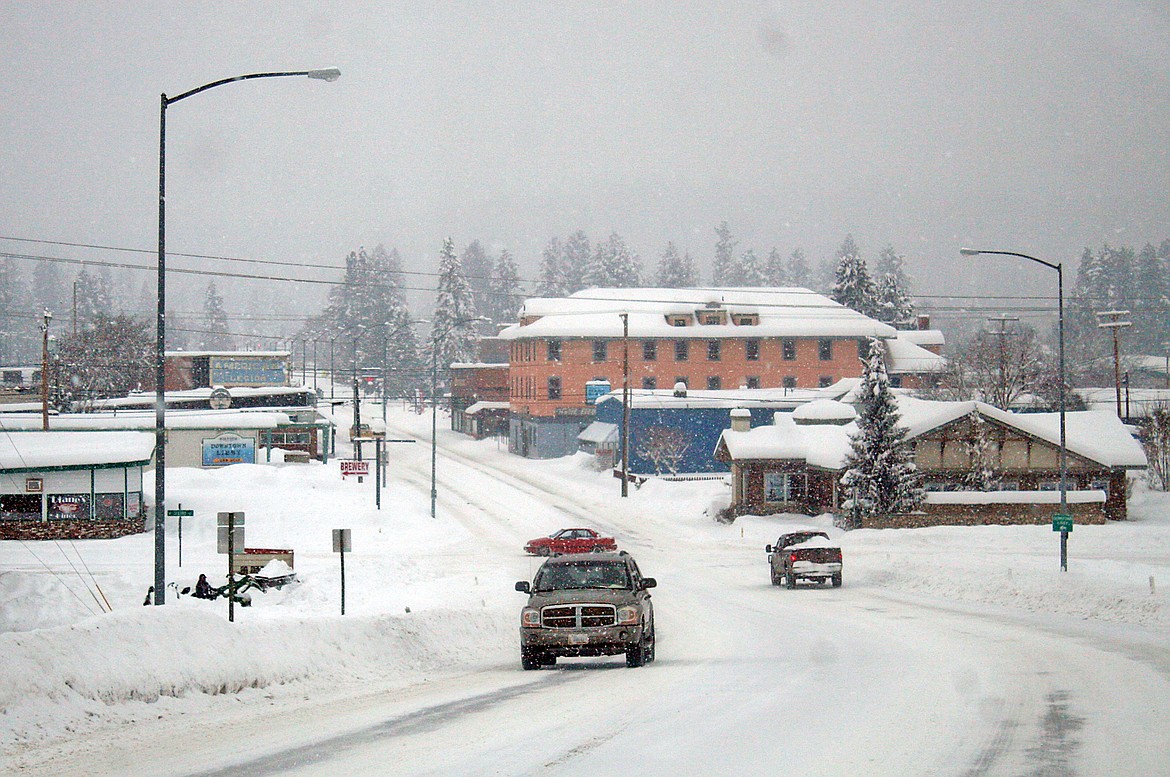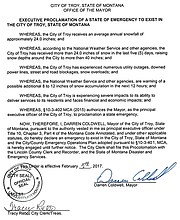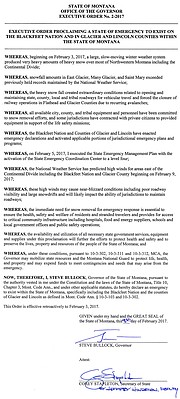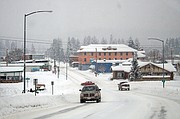State of emergency declared in Lincoln County
Governor Steve Bullock issued an executive order on Friday declaring a state disaster to exist on the Blackfeet Nation and in Glacier and Lincoln Counties, and authorized the National Guard and expenditure of funds to assist with community health and safety.
Lincoln County declared a state of emergency this week, and the towns of Libby and Troy have each drafted their own, individual declaration of state of emergency ordinances that were submitted to Governor Bullock, who then declared the state of emergency in the region.
After peak snowfall of 25-30 inches of snow fell on south Lincoln County last weekend, road closures, hazardous driving conditions, building closures and damages to infrastructure, left the county and cities to try and manage the heaps of snow as quickly as possible — a costly task.
“This winter storm has proven extremely damaging to roadways, railways and Montanans relying on access to critical community infrastructure,”Governor Bullock said of the declaration. “Thanks to strong partnerships at the local and state levels, communities are keeping their residents safe as record amounts of snow move through our state.”
State of emergencies are common at the state, county and city levels in response to natural disasters. They permit authorized personnel to take all appropriate action needed to alleviate the effects of a disaster.
“A local declaration means that counties or municipalities have declared that circumstances of an event (be it weather, fire, flood, etc...) are too great to be done at a normal level of service — therefore declaring an emergency is how counties and municipalities remove snow beyond their ordinances, hire additional help, etc,” Emergency Management deputy Lisa Oedewaldt said in an email.
When enough local declarations are received by the state, and relief from weather or other events is not close, then the governor may decide to issue a “State of Emergency” for areas affected, Oedewaldt said.
When this is done by the governor, it opens up funding possibilities for government entities and public infrastructure including government building, roads, bridges and utilities Oedewaldt said, stressing private citizens don’t directly receive the benefits.
In order for this to happen, each jurisdiction has a process to follow:
1. Declare an emergency
2. Declare to initiate their two-mill Tax Levy onto their residents;
3. Exhaust any disaster funds that are in their budgets;
4. Exhaust all local resources
After the county and cities work locally with insurance, county recourses and private contractors, and use up those recourses, they submit a request to the governor for consideration for state funding for reimbursement.
Oedewaldt stressed that the submission is not a guarantee.
“I’ve been asked why we don’t initiate the National Guard,” Oedewaldt wrote in the email. “They are expensive and they will ask if you have used all local resources first, also, it usually takes some time to mobilize them.
Libby’s draft ordinance for a declaration of snow emergency for the City of Libby called the recent event “unprecedented” causing “unhealthy, unsafe and unsustainable conditions exist within the city limits of Libby.”
“Libby is experiencing severe impacts to its ability to deliver services to its residents and faces economic impacts,” the ordinance said.
Troy’s ordinance was signed and sealed earlier this week. Troy is facing many of the same issues as Libby, with the addition of power outages that affected two-thirds of the town and around 2,000 people in the surrounding area for up to 24 hours.
Troy Mayor Darren Coldwell said the state of emergency gives them the opportunity for two additional mills for snow removal expenditures. As of now, the costs are adding up in Troy with the snow plows working overtime and the cost of fuel for the equipment.
The cost isn’t the only issue piling up.
“We’re at a point right now where we have no place left to put the snow, and we don’t have the equipment to move it,” Coldwell said. “You can plow snow all you want, but you’re just moving it around if you have no where to put it.”
Coldwell said that they’re going to wait and see if the weather warms up over the weekend, if not, the burden may fall on the taxpayers in Troy.
The value of the two-mill emergency levy in Libby is $4,944, in Troy it’s $1,356 and Lincoln County’s is $54,722
According to a press release issued Friday, state resources have been requested to ensure the health, safety and welfare of residents and stranded travelers, and provide access to critical community infrastructure including hospitals, food and energy supplies, schools and local government offices, and public safety operations.







